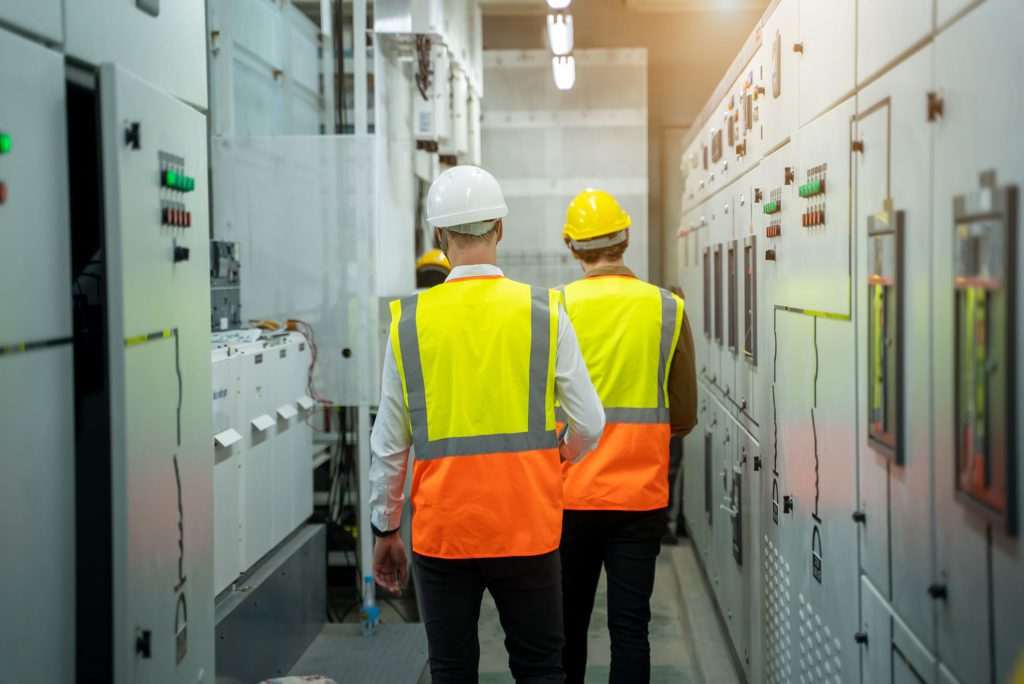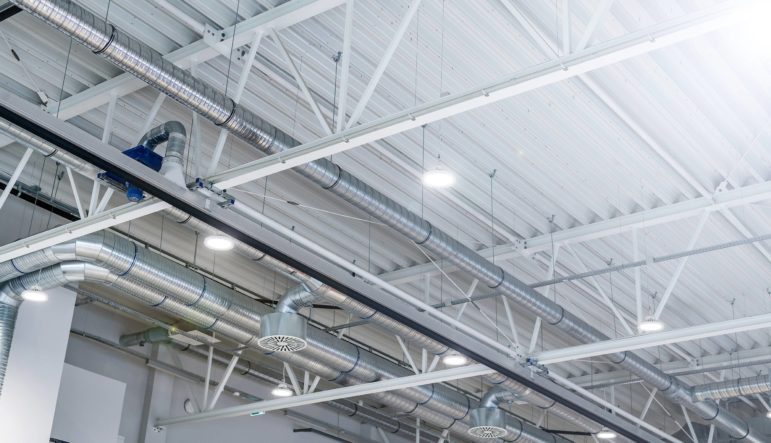Electricity is vast. The world uses so much electricity (nearly 24,000 terawatts/hour according to Statista!) and in so many ways that different types of electricians are required for different premises.
Two such types of electrical contractors are industrial and commercial electrical company. Knowing which one is most suited to your electrical needs can prove invaluable, as this will get you quicker and more cost-effective help should you need it.
This article will explore what it means to be a commercial and industrial electrician, and highlight the key differences between the two.
Plus, check out our blog for further details onthe commercial electrician advantages. You can also find information on the difference between commercial & residential electricians.

As the name suggests, a commercial electrician works primarily on commercial sites. These could include hotels, shopping centres, restaurants, and nursing homes.
A commercial electrician, like other electrical contractors, are highly qualified and skilled at what they do. At Pro Point Electrical, this is certainly true of our commercial electricians, who have all undergone rigorous training to ensure they can serve you in the best way possible.
The main difference between commercial and industrial electricians is to do with their work environments. You’ll typically find a commercial electrician in retail buildings, hospitals, schools, hotels, and other commercial premises.
An industrial electrician, on the other hand, works on sites such as factories, mines, production plants, and chemical laboratories. Their processes might be different to those of their commercial counterparts, and will often involve a greater focus on linking electrical knowledge with engineering, robotics, or hydraulics know-how.
Aside from this, commercial and industrial electricians perform much of the same sort of tasks – just on different scales. These can include diagnosing faults, installing lighting, repairing machinery, and renovating or expanding the site.
To become a commercial electrician, you’ll have to jump through a fair amount of hoops. This is all standard training and apprenticeships, but it’s necessary because of the importance and potential danger of the work.
A commercial electrician will normally work as part of a team, as the projects are often too large for a sole person to handle. This also ensures the quality of a project by facilitating accountability.
Commercial and industrial electricians differ in certain aspects of their job, but only in the type of knowledge required. Industrial electricians, for instance, need training in specific areas to be able to work effectively in highly specialised environments like mines and production plants.
Since commercial electricians work in different locations, their training is unlike those of their industrial counterparts. They need to understand and use electrical systems that are found in commercial buildings, which are often separate from those in large industrial areas. However, the underlying skills remain the same across all electrical specialities.
Aside from the differing technical and specialist knowledge, there are a lot of soft skills that commercial and industrial electricians share. These all play a vital role in their daily duties and are intrinsic to being a good electrician. Check out all the soft skills that both commercial and industrial electricians require below.
The job of an electrician is a lot more intellectual than people tend to give it credit for. In fact, mathematical skills like trigonometry and geometry are frequently required in the day-to-day duties of an electrician. As a result, commercial and industrial electricians alike need a fairly good understanding of maths, physics, and algebra.
The maths skills involved in being an electrician go beyond simple sums. A commercial electrician might use physics calculations to work out the voltage, current, and resistance of various commercial circuits, for example. This is highly important in preventing electrical systems from overloading and damaging appliances and people.
Industrial electricians need algebraic skills too, such as when solving equations related to industrial circuits. They might also use trigonometry to calculate precise angles, something that’s especially important in the high risk zones where they work. A slight error in their calculations could lead to dramatic consequences for the company.
The nature of an electrician’s work is often highly specialised and technical. What’s more, electricians will frequently find themselves working independently, without anyone to fall back on if they make mistakes. As such, problem-solving skills and critical thinking form two crucial parts of an electrician’s job, both in commercial and industrial situations.
Diagnosing electrical faults and finding appropriate solutions to the problems are what defines an electrician. If they find an issue, a good electrician applies adept problem-solving skills in order to establish the best course of action to take. This might be a straight fix, an upgrade, or a complete replacement. Whatever the situation, an electrician must think on their feet to provide the best service possible.
Being a commercial or industrial electrician is never a dull job, as you’ll have to undertake all kinds of tasks in a variety of scenarios week by week. This means that sometimes you’ll be working individually, but more often than not you’ll be part of a team. The scale of the premises where commercial and industrial electricians work means that teamwork is typical, so it’s important that these types of electricians demonstrate a capability to work as a team alongside others.
Both commercial and industrial electricians will often have to cooperate with other people to enable them to work effectively. This could include working alongside other electricians, reporting to the electrical foreman, or liaising with engineers and architects about a construction project.
Electricians are there to provide the quickest, safest, most robust solution for their customers and clients. And since many electricians work freelance or manage their own business, time management skills are a must-have for a successful operation.
An electrician’s work goes beyond electrical installations and repairs, there’s also a great deal of administrative tasks involved, like reporting and testing. The variety of duties that an electrician performs means that time management is crucial, as they have to balance their time between a whole heap of tasks.
One of the main responsibilities for an electrician is to liaise with customers, clients, and companies to ensure your work is as transparent and satisfactory as possible. Residential electricians need the best customer service skills, as they are dealing with homeowners directly, but commercial and industrial electricians also need good interpersonal skills since they will occasionally deal with clients and other contractors.
This is why communication skills are a core part of being an electrician, as they are with most jobs. Emotional intelligence is becoming an increasingly useful trait to have for an electrician, as it leads to improved interpersonal relations, faster decisions, and more satisfactory end results.
Commercial electricians play an important role in keeping society afloat. Without them, the world as we know it would cease to exist. This may sound exaggerated and dramatic, but it’s true – commercial electricians provide businesses, services, and any building used for commerce with safe electricity to power their operations.
It’s not just hotels and restaurants that commercial electricians serve, there are more essential services they aid. Shops, schools, and hospitals are all under the jurisdiction of a commercial electrician, demonstrating just how important commercial electricians are to our society.
No matter how big or small the electrical problem is, our electricians are always on hand to provide that much-needed assistance, even if it’s just a bit of safety guidance you’re after.
We have a range of electricians qualified for each and every electrical job, so why not give us a call on 0401 757 325 or send us an email at nick@propointelectrical.com.au and we’ll get back to you as soon as we can.

